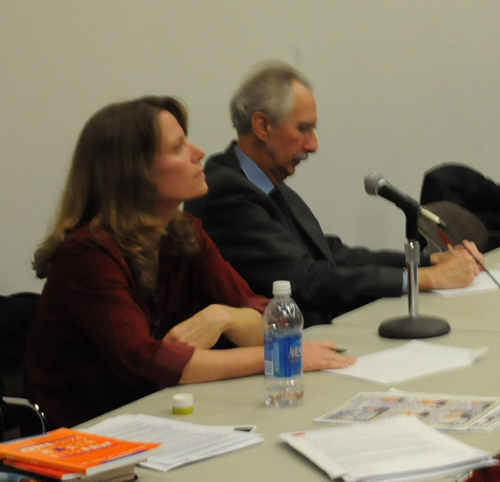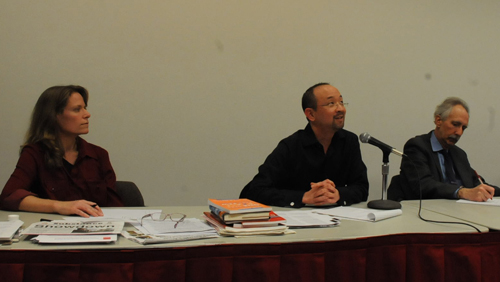Fair Test says... Best way to reduce test cheating is to end high-stakes testing
[Editor's Note: The following appeared as "How To Stop Cheating On Standardized Tests" in the Washington Post "The Answer Sheet" Blog (February 17, 2012). The blog is produced By Valerie Strauss. This iteration of it, along with the Fair Test notes, was forwarded to Substance by Bob Schaeffer of Fair Test (www.Fairtest.org].
 Above, Chicago Teachers Union Testing Committee chair Sharon Schmidt (a Steinmetz High School teacher who also serves as editor of Substance) and Monty Neill of Fair Test appeared at a forum at the University of Illinois at Chicago (UIC) on February 15, 2012. Substance photo by George N. Schmidt.In light of repeated cheating scandals on standardized tests in school districts across the country, the Education Department recently asked members of the public for ideas on how to prevent, detect and respond to irregularities on completed tests.
Above, Chicago Teachers Union Testing Committee chair Sharon Schmidt (a Steinmetz High School teacher who also serves as editor of Substance) and Monty Neill of Fair Test appeared at a forum at the University of Illinois at Chicago (UIC) on February 15, 2012. Substance photo by George N. Schmidt.In light of repeated cheating scandals on standardized tests in school districts across the country, the Education Department recently asked members of the public for ideas on how to prevent, detect and respond to irregularities on completed tests.
The idea is for the department to collect the information and share it with school districts around the country. Here’s a response just sent to the department by the National Center for Fair & Open Testing, or FairTest, a non-profit organization dedicated to ending the unfair use and misuse of tests.
Response to U.S. Department of Education Request for Information to Gather Technical Expertise Pertaining to Testing Integrity February 16, 2012
Over the past three academic years, the National Center for Fair & Open Testing has confirmed cases of standardized test cheating in 32 states and the District of Columbia (see attached list). The root cause of this epidemic is clear from in-depth investigations into some of the most egregious scandals. Misuse of standardized tests mandated by public officials has created a climate in which increasing numbers of educators feel they have no choice but to cross ethical lines.
If the U.S. Department of Education is serious about its commitment to assessment integrity, it must act to reduce test cheating by stopping promotion of test score misuse.
Despite their high-sounding statements about assessment reform, President Obama and Secretary Duncan are adding incentives for cheating by ratcheting up the emphasis on standardized exams scores through initiatives such as “Race to the Top” and their criteria for states to receive waivers from “No Child Left Behind.” The continued emphasis on annual high-stakes annual testing in these programs and, especially, new requirements to assess teachers based on their students’ scores virtually guarantees even more cheating will take place.
The administration’s favored policies also contradict the findings and recommendations of “Incentives and Test-Based Accountability in Education,” the important report released last year by the National Research Council of the National Academies of Science. That study’s distinguished panel of experts concluded that high-stakes testing has not improved educational quality.
Widespread cheating is an inevitable consequence of overuses of high-stakes testing, as predicted by renowned social scientist Donald Campbell. In 1976 he wrote in what is now called Campbell’s Law, “The more any quantitative social indicator is used for social decision-making, the more subject it will be to corruption pressures and the more apt it will be to distort and corrupt the social processes it is intended to monitor. . . when test scores become the goal of the teaching process, they both lose their value as indicators of educational status and distort the educational process in undesirable ways.”
Recent examinations of major outbreaks of cheating confirm the accuracy of Campbell’s prediction. In Atlanta, Georgia, for example, the Governor’s Bureau of Investigation found that test score misuse was a major reason for why cheating occurred. They wrote, “The targets . . . were often unreasonable, especially given their cumulative effect over the years. Additionally, the administration put unreasonable pressure on teachers and principals to achieve targets. . . ultimately, the data and meeting ‘targets’ by whatever means necessary, became more important than true academic progress.”
In their report on the Dougherty County System, the Georgia Special Investigators identified similar causes. In the section titled “Why Cheating Occurred,” the investigators cite No Child Left Behind’s “pressure to meet AYP targets” as “a significant motivation for cheating” finding, “This pressure drives some individuals to cross ethical lines.” They concluded, “Since the enactment of NCLB, standardized testing has become more about measuring the teachers, principals and schools than accurately assessing the children’s academic progress.”
In terms of “best practices” for detecting and responding to testing irregularities, there is no need for a massive federal study. The reports by the Georgia Office of Special Investigators examining cheating in Atlanta area schools are a model for policy-maker response. A comprehensive review by independent law enforcement professionals — not politicians or bureaucrats who may have vested interests in protecting current policies and personnel — is necessary. Combined with the use of the full range of forensic detection tools — including analyses for high numbers of erasures, unusual score gains, and patterns of similar responses — this approach has proven most likely to root out the full truth.
More policing and better after-the-fact investigations will not, however, solve the many problems caused by the politically motivated misuses of standardized exam scores. Instead, high-stakes testing requirements must end because they cheat students out of a high-quality education and cheat the public out of accurate information about school quality.
 Sharon Schmidt, Kevin Kumashiro, and Monty Neill at UIC on February 15, 2012. Substance photo by George N. Schmidt.http://www.washingtonpost.com/blogs/answer-sheet/post/how-to-stop-cheating-on-standardized-tests/2012/02/16/gIQAPF0nIR_blog.html
Sharon Schmidt, Kevin Kumashiro, and Monty Neill at UIC on February 15, 2012. Substance photo by George N. Schmidt.http://www.washingtonpost.com/blogs/answer-sheet/post/how-to-stop-cheating-on-standardized-tests/2012/02/16/gIQAPF0nIR_blog.html
CONFIRMED CASES OF TEST-CHEATING (2008-2012)
According to FairTest's records, in the past four school years one or more cheating cases have been documented in the following jurisdictions:
Arizona #
California #
Colorado #
Connecticut
District of Columbia # *
Florida #*
Georgia *
Indiana *
Illinois
Kentucky
Louisiana
Maine
Maryland
Massachusetts
Michigan #
Minnesota
Missouri
Mississippi
Nevada
New Jersey *
New York *
North Carolina
Ohio #
Oklahoma
Oregon
Pennsylvania *
Rhode Island
South Carolina
Tennessee
Texas *
Virginia
Washington
Wisconsin
# Included in March 2011 USA Today/Gannett investigative series
* Multiple reports or apparent systematic pattern
Updated February 15, 2012 – Bob Schaeffer

